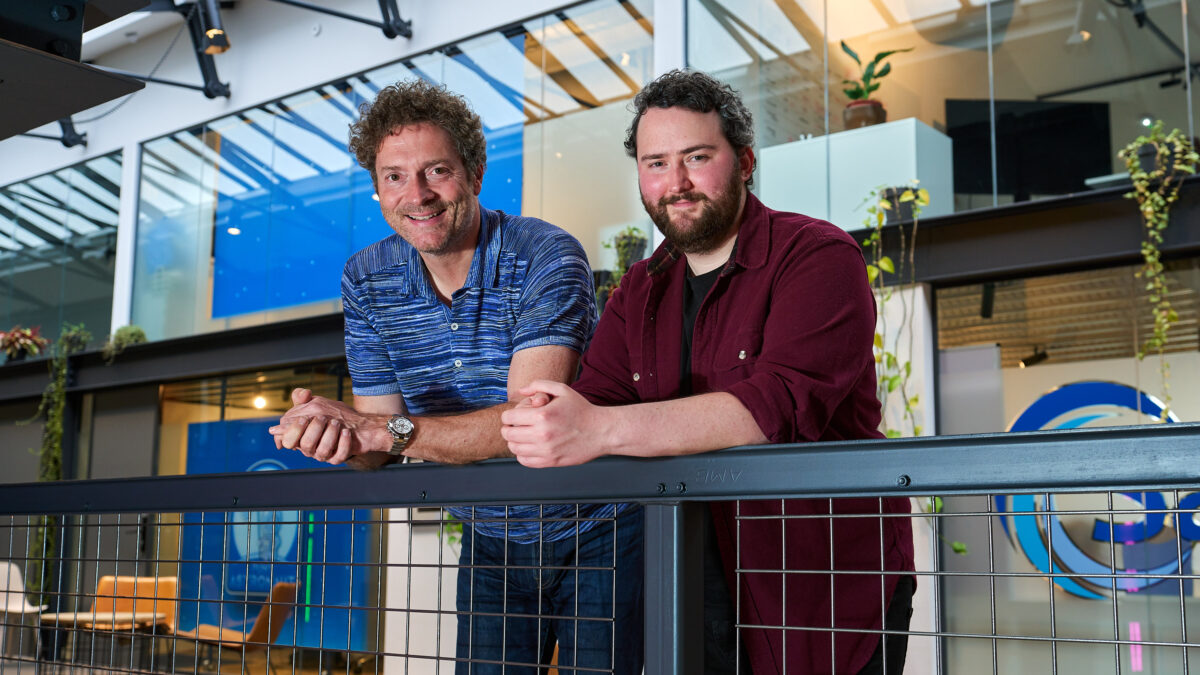Few people in Scotland have built tech firms that have had global success, but Chris van der Kuyl is one of them. As founder and chairman of 4J Studios, he helped bring the hugely popular video game Minecraft to consoles, a title that continues to sell millions of copies worldwide every year.
With a tech career stretching back 30 years, van der Kuyl is now playing a key role in developing today’s digital economy in his native Dundee. As a video game-entrepreneur-turned-investor, he advises the next generation of would-be startup founders, and is keen to bang the drum for the city and the wider region.
There has arguably never been a better time: spruced up by a £1 billion waterfront redevelopment, with new high-rises dotted around the visually arresting sight of V&A Dundee, the former trading post feels like a place rediscovering its mercantile past – albeit now in the digital age.
“Compared to when I started out in the early 90s, the place has undoubtedly completely transformed,” says van der Kuyl, who was appointed CBE in 2020 for services to the economy.
“Back then there were a couple of large-scale businesses that had a digital element to them, and a relatively small talent pool to draw from. “There was a recognition that if we didn’t do something to develop that talent pool, it wasn’t going to be sustainable.”
He describes the decision by Abertay University to add computer gaming to their undergraduate course programme more than 25 years ago as a “pivotal” moment in the city’s development. The university is now internationally-renowned for video games education and research and integral to the success of the industry in Dundee and Scotland. It provides the graduate talent pipeline to existing companies, supports the development of startups and is pushing new boundaries in ‘applied games’ research, development and innovation for sectors beyond entertainment such as education and healthcare.
The city now has more games developers per head of population than any other city in the UK. The majority of these companies are either run by or employ Abertay graduates, and many continue to work closely with the University’s School of Design and Informatics and the InGAME (Innovation for Games and Media Enterprise) centre, which works to increase the scale and value of the sector, and drive innovation.
InGAME has played a key role in helping to scale up some of the most promising gaming startups. In March 2021, Ninja Kiwi Europe, led by Abertay graduates David Hamilton and Barry Petrie, was acquired by Swedish entertainment company Modern Times Group for $142m, and last May Hyper Luminal Games announced it would more than double its staff headcount from 20 to 50, having more than tripled its annual revenue to £3m.
Much of that future talent was on display at this year’s Digital Graduate Show, on June 2. Students from countries around the world – including India, Switzerland, Slovakia and Italy – demonstrated their final year’s project work, pushing the boundaries in virtual reality, graphics and gamification technologies.
In addition to the cluster of 40 gaming companies, the city is also home to a burgeoning number of data analytics firms. Van der Kuyl set up Chroma Ventures with Paddy Burns, the CEO of 4J Studios, to invest in high-growth software companies and support the wider tech economy. Ace Aquatech, an aquaculture tech firm, and Broker Insights, a digital platform for the insurance industry, are among their portfolio. The gaming development studio, Puny Astronaut, recently released its maiden title Skye Tales on Nintendo Switch after a £200,000 investment from van der Kuyl’s firm.
“It doesn’t really matter if the industry is not one that we’re familiar with, as long as there is a tech component to it,” says van der Kuyl, who is speaking today at Futurescot’s Digital Scotland: Tayside conference at Abertay University’s cyberQuarter.
“We’re computer scientists, so we can understand the software, even if the market is not one we have experience of. The key thing is that we get the right partners, from those vertical markets, alongside us.”
Writ large, it’s that ethos of collaborating with the “right support network” that can help Scotland’s tech sector to flourish, he adds. He references the early success of Facebook, which was as much the result of some highly-networked investors as it was the genius of Mark Zuckerberg. Van der Kuyl is more cautious when it comes to endorsing government policy as a lever to stimulate the tech economy, however.
Whilst he welcomes the recommendations of the Scottish Technology Ecosystem Review, written by former Skyscanner executive Mark Logan, as an important “stepping stone”, he urges policymakers not to lose sight of the tech sector as an engine of growth.
“It’s great that we’ve got the Logan report and that Techscalers are now moving, but the government response overall has been pretty low level. It’s a drop in the ocean compared to the sort of strategic shift you might see in some of the Baltic states.
“What I’m saying is that where you’ve had success – as Dundee has had with gaming – you really have to double down on that. Because in Scotland, we’ve massively struggled to scale up companies to a significant size,” says van der Kuyl.
“The Logan review is an excellent stepping stone, but to go further we must have a really strong and well supported education sector, and we’re nowhere near that yet.”
Chris van der Kuyl is speaking tomorrow at the Digital Scotland: Tayside conference at Abertay University today.




